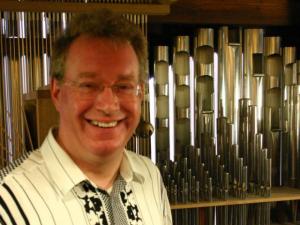PETER KING 24 August 2015
This penultimate concert in the series did not disappoint; a return visit for Peter King, organist of Bath Abbey, who presented a well chosen programme which combined sensitivity and virtuosity. As well as demonstrating great skill and musicality he also charmed the audience with his genial manner through humour and anecdote and just the right amount of context and explanation.
Guilmant’s Grand choeur (alla handel) proved to be a solid and uplifting opening piece – a good way to begin. These concerts always feature a screen which allows the audience a close up view of the performer’s hands. This proved to be of real value during the opening section of Saint-Saens’ Fantaisie in E flat which, unusually, is scored on four staves – one for each manual and the fourth for the pedals. It certainly enhances the understanding of this music by being able to track the movements of the player’s hands as they move rapidly from manual to manual.
An interesting reworking for organ by Karg-Elert of Handel’s Variations:The Harmonius Blacksmith followed and then we were given an example of 17th Century Iberian battle music, Batella de sexton tono by Jose Ximenes. A light and fluffy Lied by Wolstenholme provided a lovely interlude before the more substantial Sonata IV in B flat by Mendelssohn brought the first half to its conclusion.
After the interval two contrasting pieces by Franck were presented – the exciting and rather quirky Piece Heroique and the more conventional Pastorale. It was pointed out that the All Saints Willis allowed the composer’s registration to be followed almost completely. A short Andante Grazioso in G by Henry Smart (composed around the time of the installation of this organ) led to the final piece.
Peter King had certainly saved the most substantial work for the end of the concert. His performance of Stanford’s Fantasia & Toccata proved to be a fitting conclusion to a very enjoyable evening of music. There were some marvellous moments in this music which built in intensity and excitement throughout. Towards the end an arpeggio was executed with apparent ease – all the more remarkable when we remember how heavy this organ’s action is.
Mr King’s infectious personality and obvious belief in the value of the music he played, together with his easy rapport with the audience and mastery of the instrument (all achieved without any assistance) made this a particularly special performance. This was despite the day’s freak weather conditions causing rainwater to enter the building for most of the duration of the concert!
It is to be hoped that it is not so long before we can welcome this organist to Hastings again.
Stephen Page

